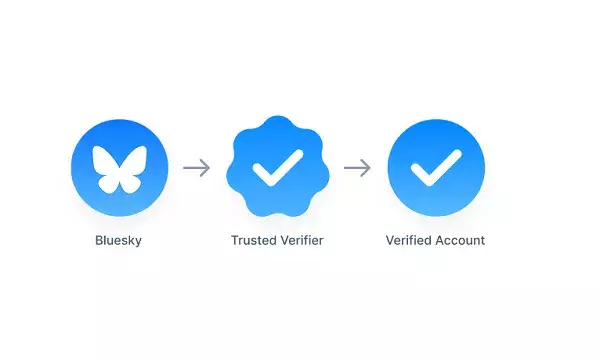Social media platforms have long struggled with authenticity and user trust. As new platforms emerge, it becomes crucial to establish mechanisms that enhance user credibility while minimizing misinformation and impersonation. Bluesky, a relatively new entrant in the social media landscape, is taking strides in this direction with its novel in-app verification system. Recently, the platform has expanded its verification rollout, allowing more users to obtain badges that signify trustworthiness and authority. This initiative marks a bold step toward elevating the overall quality of discourse within the app and addressing the challenges inherent in user verification.
Distinctive Features of Bluesky Checkmarks
Bluesky’s verification process features a distinctive bent compared to its competitors. Instead of the conventional blue checkmark associated with established firms, Bluesky employs a rounded marker that mirrors the design elements of its logo. This visual differentiation may seem superficial, but it symbolizes a broader philosophy of brand identity that Bluesky is cultivating. Notably, it introduces a second layer of verification: trusted providers. Organizations can apply to become such providers, which allows them to manage their own verification processes for affiliated users, such as journalists from esteemed outlets like The New York Times.
This dual-checkmark system could streamline the vetting process, allowing Bluesky to divert its resources toward maintaining platform integrity rather than wading through individual verification requests. By enabling organizations to verify their own members, Bluesky places trust in established entities, leveraging their reputation to maintain the platform’s credibility. However, this structure also opens the door to potential complications.
Challenges of Defining ‘Notability’
Central to Bluesky’s verification strategy is the ambiguous term “notable.” While the platform seeks to acknowledge individuals who have made significant contributions within their field or geographical area, defining what constitutes “notability” is fraught with challenges. Bluesky outlines several indicators—media coverage, professional recognition, and presence in reputable reference platforms—but the subjective nature of these criteria can lead to inconsistencies. Different stakeholders might have divergent understandings of what makes an account notable, potentially breeding confusion regarding who qualifies for verification.
Furthermore, this ambiguity raises questions about authority and bias. Who gets to decide what is “professional recognition,” and what constitutes a “credible reference”? If these determinations are not handled transparently or consistently, Bluesky risks diluting the very trust it seeks to foster. Such intricacies could render verification badges meaningless, functioning more as a status symbol than a genuine mark of authority or credibility.
Impersonation and Security Concerns
In an era where social media impersonation can wreak havoc on individuals and organizations alike, Bluesky’s initiative aims to bolster user security. High-profile figures face the constant threat of impersonation, which can undermine their credibility and mislead the public. By focusing on verifying notable accounts, Bluesky attempts to provide an additional layer of protection against impersonators, deterring those who might seek to exploit the trust inherent in social media engagement.
While the initial process to apply for verification seems straightforward, Bluesky has indicated that applicants may be required to verify their identity in the future. Such a move would establish a stronger commitment to authenticity. However, this alteration could also pave the way for privacy concerns, leaving users to weigh their desire for verification against potential risks to their personal information.
A Step Toward Transparency and User Empowerment
Despite the challenges Bluesky’s verification process presents, it’s essential to recognize the platform’s efforts to refine and enhance user trust. As the algorithmically driven spread of misinformation continues to challenge social media, providing users with a method to verify identities is an essential step toward transparency. While criticisms surrounding the ambiguity of “notability” remain relevant, they are part of a necessary discourse that will ultimately lead to more refined and robust verification processes.
Social media users have a stake in their platforms and their integrity. Bluesky’s efforts to facilitate trusted authority through an innovative verification process serve not only to empower users but also to set a precedent for other platforms. The road ahead may be rife with potential pitfalls, but the commitment to enhancing user safety and credibility is a testament to a tech landscape that prioritizes authentic voices over mere impressions.

